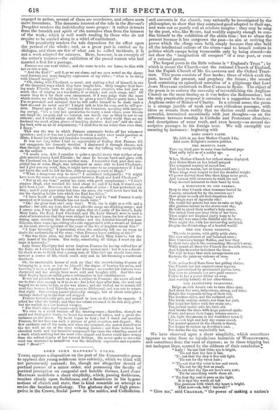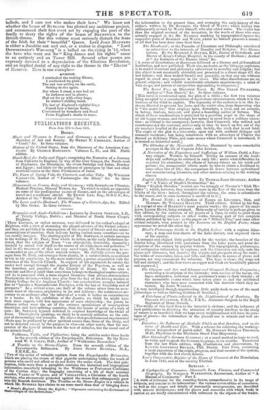LORD JOHN MANNERS'S POEMS.
THERE appears a disposition on the part of the Conservative press to applaud this young nobleman into celebrity, which we think will not permanently succeed; for, though not altogether devoid of poetical powers of a minor order, and possessing the faculty of poetical perception on congenial and humble themes, Lord JOHN MANNERS manifests a sheer simplicity, which, passing feebleness, touches closely upon foolishness, and a fanaticism in his bygone notions of church and state, that in kind resemble an attempt to revive the heathen mythology. The glorious days of high prero- gative in the Crown, feudal power in the nobles, and Catholicism
and convents in the church, may rationally be investigated by the philosopher, to show that they contained good adapted to their age, and were not so purely evil as sciolists imagine : they may be sung by the poet, who, like SCOTT, had worldly sagacity enough to con- fine himself to the exhibition of the olden time : but to abuse the present because it has outgrown the past—to aim at reviving the power which the clergy once held, simply because they also held all the intellectual culture of the times—and to broach notions in politics which escape being treasonable only by being absurd—do not show the "imagination all compact" of a true poet, or even of a rational person.
The largest poem in the little volume is "England's Trust "; by which is meant the Church—not the national Church of England, but the Popish Church of Mr. GLADSTONE and the Oxford Tract- men. This poem consists of four books ; three of which exalt the past, bewail the present, and prophesy the future ; the second book containing an episodical narrative of a pilgrimage that Lord Jonar MANNERS undertook to Don CARLos in Spain. The object of the poem is to enforce the necessity of reestablishing the Anglican Church on the same footing as it was before the Reformation ; but the only practicable proposal it contains is a suggestion to form an Anglican order of Sisters of Charity. In a critical sense, the poem is a strange jumble of weak and even ridiculous passages, with ideas so remote from reality that no diction could render them powerful, intermixed occasionally with just thoughts—as on the difference between worship in Catholic and Protestant churches ; and descriptions of some truth, and even beauty—as several de- scriptive passages in his foreign tour. We will exemplify our meaning by instances : beginning with LORD JOHN'S FAITH.
My faith in my dear Mother Church I fix, And scorn Religion's modern politics.
THE BLISSFUL PAST.
Turn my tired gaze to sonic time-hallowed page That sadly tells us of a nobler age. • • 'When Mother-Church her richest stores displayed, And Sister-State on her behalf arrayed The tempered majesty of sacred law,
And loved to reason, but at times could awe' • When kings were taught to feel the dreadful weight Of power derived from One than kings more great, And learned with reverence to wield the rod They deemed intrusted to their hand by God.
A HORTATIVE TO THE CLERGY.
Deep in that Church what treasures buried lie Unseen, unlooked for by the careless eye! How gleam in each old half-forgotten rite The magic rays of Apostolic rite I Oh, would her priests but dare to raise on high Her glorious banner to the storm-rent sky, Be bold to plead their mother's holy cause, Nor shrink from one least tittle of her laws, Then might our England justly hope to be What she was once—the faithful and the free; Then might she, with her meteor-flag unfurled, Despise the threatenings of a banded world!
THE ONE THING NEEDFUL.
'Tis vain to praise, with giddy pride elate, The nice adjustment of our balanced state ; How Commons temper Nobles, and how they In their turn check the encroaching Monarch's sway, While round all three the Church her tendrils twines, And helps to render indistinct the lines. 'Tis vain to hope that such arrangements can Restrain the pent-up violence of man. • • 'Vain, unless freed from those her galling chains, The Church her lost expansiveness regains, And, unrestrained by mortmaha's jealous laws, May dare to advocate her own good cause— Unless in her a power divine we own, And worship humbly at her altar-throne.
TUE FLORENTINE PEASANTRY.
Deign on rich Arno's vale to turn thine eyes, And mark her sons, industrious, strong, and wise; Behold the vineyards telling of their toil, The luscious olives, and the cultured soil ; The lovely maiden shrinks not from her part, But helps her father with her ready art; The jocund urchin adds his little aid, And breaks the clods with huge paternal spade. Plenty and peace their happy labours crown : (Ab, sight uncommon in our wealthiest town I) Yet as each high and holy day comes round, The poorest peasant in the church is found, Nor deigns to reckon up devotion's cost„ Nor deems the day unprofitably lost.
We have observed upon a sheer simplicity, which sometimes appears to arise from an injudicious imitation of WORDSWORTH, and sometimes from the want of rhymes ; as in these tripping but not inelegant lines, marred by the oddness of their conclusion.:
"Lady ! 'tis not that thine eye is bright, 'Tis not that thy face is fair, 'Tis not that thy step is free and light, 'Tis not for thy raven hair ; "'Tis not that thy voice is low and sweet, 'Tis not for thy foot so small, 'Tis not that thy lips are love's own seat ; 'Tis for something worth them alL "'Tis that thy soul is pure as the light, It is that thy words all tell
The goodness with which thy heart is bright,
That now—ah, lady ! farewell!"
"Give me," said CHATHAM, "the power of making a nation's ballads, and I care not who makes their laws." We know not whether the house of RUTLAND has plotted any ambitious project, and commenced their first overt act by engaging the poet of the family to decry the rights of the house of BRUNSWICK to the British throne. But this volume must seriously disturb the fears of the Irish for their" beautiful" Queen. Lord Join; MANNERS is either a Jacobite out and out, or a traitor in disguise. "Lord Derwentwater's War-song" is a ballad on the rising in '15, when the hero who went out for" King James and his rights" came to an untimely end on Tower Hill. Several other poems are expressly devoted to a depreciation of the Glorious Revolution, and an implied denial of any right to the throne in the "Elector" of Hanover. Here is one example—
AVIGNON.
I overlooked the rushing Rhone, I overlooked its plain ; The sun was setting on the earth, Setting to rise again.
But where I stood, a sun had set In darkness and in gloom ; Had set for ay with every hope, In winter's chilling tomb. The last of England's rightful kings Found here a foreign home, Condemned by treachery and fraud From England's shores to roam.



























 Previous page
Previous page